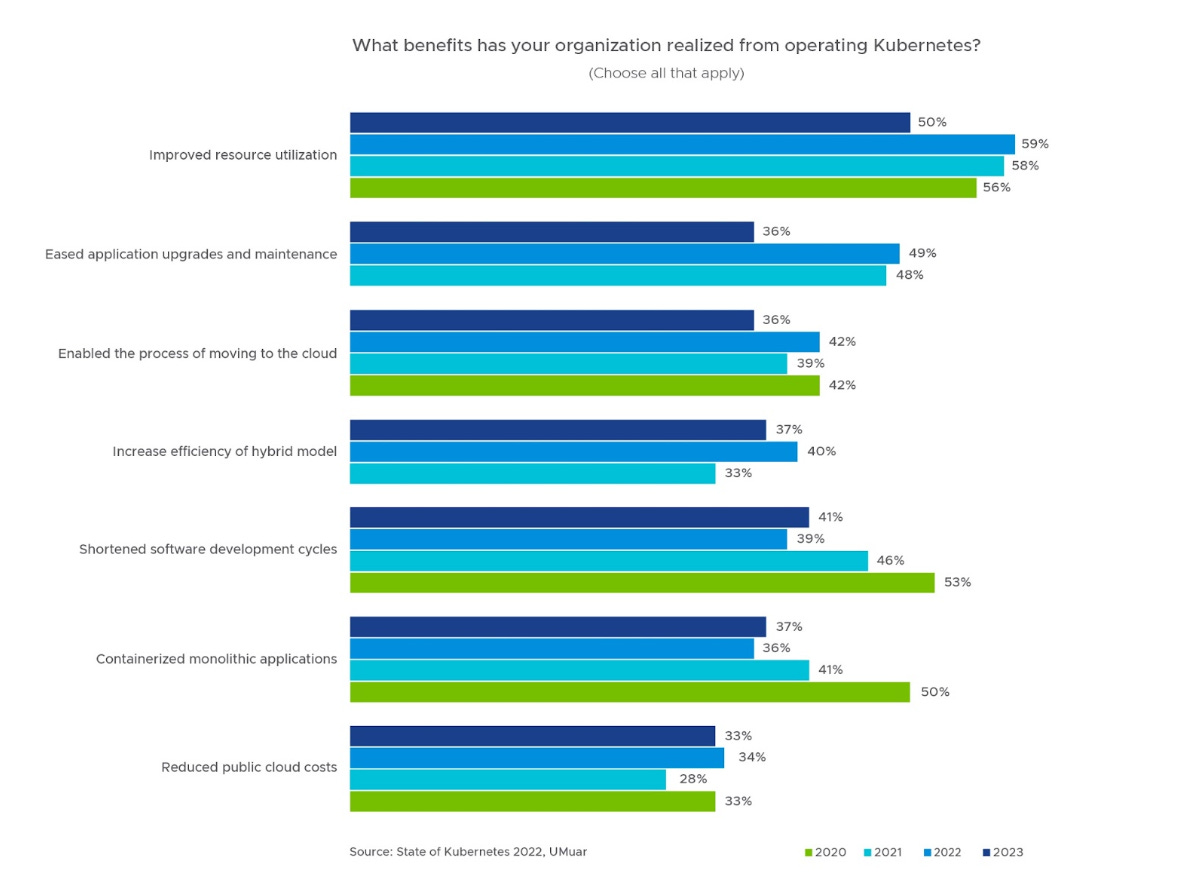from tasty broth to jiggly chicken slime in the fridge
Kubernetes benefits for developers, operations, and the business from our recent survey
That’s a chart from our recent State of Kubernetes survey that I’ll probably use a lot this year. Here’s my commentary on it from a blog post this week:
In our surveys, I’ve been using the software release cycle question to represent developer benefits. For the most part, the faster developers can release software, the better their software will be. There are exceptions, but not many. The sooner you have people using your software, the more feedback you'll get about the quality, usability, and overall usefulness of your software. A week is probably the best release cycle time, maybe two. But if you’re waiting a month, six months, or (even worse) a year to test your assumptions about your software, your business is going to ossify, if not just turn from tasty broth to jiggly chicken slime in the fridge.
When you look at the four years of answers here, you might have a distressing insight: year after year, Kubernetes seems to be slowing developers down. This matches the years of Kubernetes complexity commentary and developer experience discussion we started hearing two or three years ago.
My theory is that as Kubernetes becomes more and more mainstream, many more people are learning to fit Kubernetes into their organizations. The people who were using Kubernetes in 2020 are different from those in 2023. This is a classic diffusion of innovations effect: the first users of a technology are willing—interested even!—to put up with the technology's complexity and (usually tedious) user experience. As you enter the mainstream, the new users are less so inclined to tolerate toil.
This year, there’s been improvement in shortening release cycles, but nothing huge. It’s at least going back in the right direction. Organizations certainly believe that Kubernetes is better for developers, with 60 percent of them saying developers are more productive.
Read the rest of the blog post. I also cover the business benefits people say they’re getting from Kubernetes and the demographics of the survey.
My Content
There’s the second installment of my State of Kubernetes survey analysis, above! There’s a third about tools used coming up, next week perhaps.
Here’s a video of my talking about tools use in the survey, above It has my occasional special guest star in it.
Software Defined Talk #414 - Monolith vs. Microservices - we went a little too hard on IBM Watsonx probably, but that’s sort of on-brand for the podcast. Brandon’s summary: “This week we discuss Monolith vs. Microservices , PassKeys replacing passwords and the return of Watson(x). Plus, some thoughts on the media and BlueSky.”
Relevant to your interests
Use Forrester’s insights to calm depositors and prevent a bank run - Europeans are trusting their banks a lot more than Americans: ‘Among US online consumers, 40% agreed with the statement, “Recent problems with banks have made me more concerned that my bank will not be there for me when I need it.” French online consumers had similar sentiments: 38% of them agreed. But only 28% of UK online consumers felt the same.’ And: ‘Nearly 40% of each of the three groups we surveyed agreed with the statement that “Larger banks are inherently safer than smaller/regional banks.’
Why Are You Doing This? (Wrong Answers Only) - Some of these are mostly (only?) for companies focused on profitless-growth and raising their valuation (startups and recently IPO’ed tech companies). If you’re at a company focused on cashflow and more long term share price, many of them are what you should be doing. In the first mode, you’re looking to build up “story” and visions of future valuation, and the cash out before things level out. In the second mode, you (the individual from IC to CEO) are looking to maximize your take with as much job security and steady raise in comp. as possible. And, sure: many of these are bad no matter which mode you’re in.
Setting the Record Straight on Cloud Computing ROI - Ability to add new features(quickly), access to new tech, scaling and performance, toil reduction to focus on things valuable to the business or competitive advantage, better security. Of course reducing costs (or “efficiency” if you’re forced to feel the “do more with the same/less” vibe) is one, but that’s not the point of the article.
The Definition Of “More From Less” In B2B Content Strategy And Operations - The best tip here is to focus a lot on recycling what you have already. I agree: there’s always a lot of assets and not near enough promotion and reuse/remixing of them. // “When asked about their perception of the content that they receive from vendors who market to them, 61% of business buyers say that vendors give them too much content, and 63% say that what they get is more focused on style than substance. And here’s the kicker: 69% — close to three-quarters — say that if the content from vendors that they currently do business with isn’t valuable or helpful, they’re not likely to expand contracts. On top of this, businesses know that they’re pumping out content that doesn’t meet the mark: 61% say that one-quarter to three-quarters of their content goes to waste — that it isn’t used as intended.”
VMware strives to become the multi-cloud leader - Overview of VMware’s current strategy, etc. from the VMware analyst day.
IBM looks to turn nearly 8,000 jobs over to artificial intelligence, CEO says - ’“I could easily see 30% of that getting replaced by AI and automation over a five-year period,” Krishna told Bloomberg News, referring to “back-office” positions such as in human resources.’"
IBM Watson missed the AI revolution, but Watsonx could become the heartbeat of the Generative Enterprise - Overview of the three parts of Watsonx, and discussion of what the deal is with it. I joined the waitlist.
Gartner Says Layoffs May Ultimately Harm Shareholder Returns - After firing people to lower costs, the remaining staff have to do more work, either demanding more pay of getting demoralized and seeking another job. Also, if you want to grow revenue, you’ll need more staff, so you’ll hire contractors, and eventually want to hire back more staff. There’s also a list of novel alternatives, including a four day work week!
Apple Makes More Fintech Moves With High-Yield Savings Account From Goldman Sachs - Very detailed overview of “Bank of Apple.”
Docker makes comeback with over $50M in ARR two years into restructuring -
Twitter doesn’t drive many substuck views - “At the start of the year, Twitter on average drove less than 3% of all views across Substack. Today, it accounts for less than 2%.” For my newsletter, Twitter is fine, it’s third place in views (2,923 since Dec 8th, 2022) after the actual newsletters (32,551), and the always mysterious “Direct” source (8,007). Twitter has also driven 31 new subscriptions, I currently have 593 subscribers.
KubeCon Europe 2023 highlights Kubernetes explosion and need for instant platform engineering, CNCF - “10,000 attendees, 58% of whom were new to the conference, with another 2,000 people on the waitlist” And: “Surveys show that Kubernetes complexity, security, and a skills gap are the top challenges organizations face in adopting Kubernetes… Managing configuration complexity at a global platform scale, Painful Kubernetes upgrades, Multi-cluster management”
Wastebook
“Encomium” Here.
“And so, I’m just like: ‘how do I not get thrown out this room?’…cause I’ve been thrown out of a few rooms…” https://overcast.fm/+_cBeGzGbE
Pizza pilgrim
OH: “It’s just a shame that you can’t make selling old furniture anymore.”
OH: “No budget… so I’ve lost my entire UK marketing plan.”
“Jerome K. Jerome in the phrase: “There is no fun in doing nothing when you have nothing to do.”” From How to Be Idle: A Loafer’s Manifesto by Tom Hodgkinson
“Travailler moins, produire plus. The less you work, the more you produce… Work expands to fit the time provided.” Ibid.
“We need to claim lunch back. It is our natural right. It has been stolen from us by our rulers. The fear that keeps you chained to your desk, staring at your screen, does not serve your spirit. Lunch is a time to forget about being sensible, practical, efficient. A proper lunch should be spiritually as well as physically nourishing. Cosy, convivial, a treat; lunch is for loafers.” Ibid.
Upcoming
Things I’ll be doing, places I’ll be going.
June 1st VMUG Belgium in Brussels , free. June 7th State of Kubernetes overview, online. June 8th to 9th PlatformCon, online. June 21st Cloud Foundry Day, Heidelberg June 22nd to 23rd DevOpsDays Amsterdam, attending. August 21st to 24th SpringOne & VMware Explore US, in Las Vegas. Sep 6th to 7th DevOpsDays Des Moines, speaking. Sep 18th to 19th SHIFT in Zadar, speaking.
Logoff
I’ve been in London this week. As always, it’s great to see old friends. Like most middle-aged people (men?) I don't spend enough time cultivating my friends at home. Nice seeing all y’all :)




